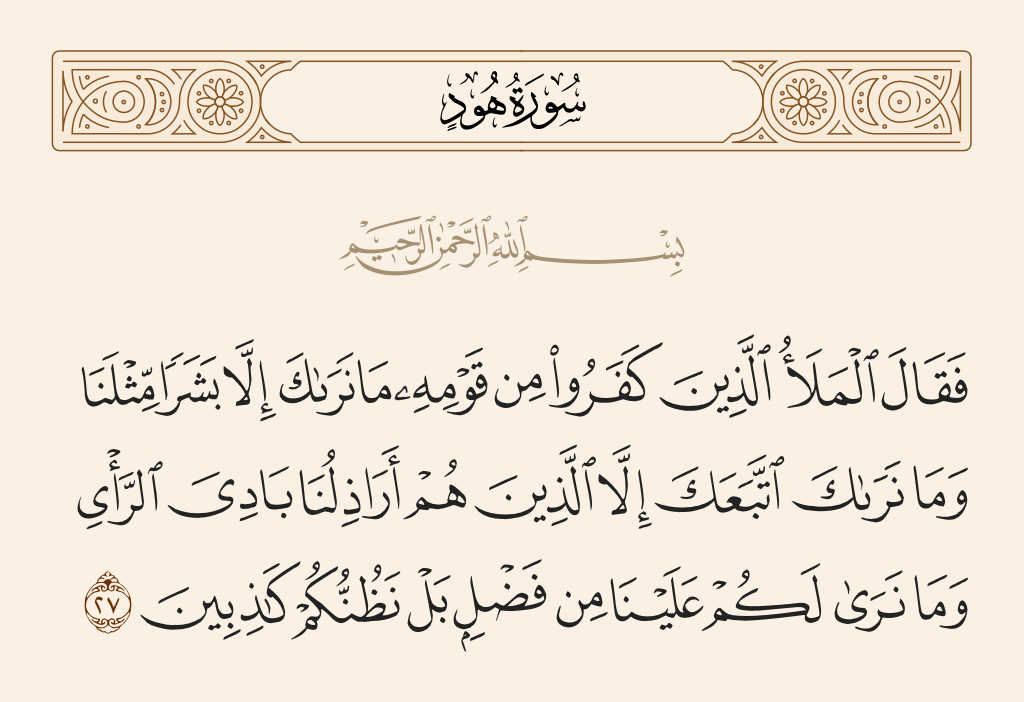Surat Hud Verse No. 27: Reading and listening
Translation of the verse 27 from Surah Hud : Number of verses 123 - - page 224 - Part 12.

﴾فَقَالَ ٱلۡمَلَأُ ٱلَّذِينَ كَفَرُواْ مِن قَوۡمِهِۦ مَا نَرَىٰكَ إِلَّا بَشَرٗا مِّثۡلَنَا وَمَا نَرَىٰكَ ٱتَّبَعَكَ إِلَّا ٱلَّذِينَ هُمۡ أَرَاذِلُنَا بَادِيَ ٱلرَّأۡيِ وَمَا نَرَىٰ لَكُمۡ عَلَيۡنَا مِن فَضۡلِۭ بَلۡ نَظُنُّكُمۡ كَٰذِبِينَ ﴿
[ هود: 27]
The chiefs of the disbelievers among his people said: "We see you but a man like ourselves, nor do we see any follow you but the meanest among us and they (too) followed you without thinking. And we do not see in you any merit above us, in fact we think you are liars."
English - Sahih International
So the eminent among those who disbelieved from his people said, "We do not see you but as a man like ourselves, and we do not see you followed except by those who are the lowest of us [and] at first suggestion. And we do not see in you over us any merit; rather, we think you are liars."
Tafheem-ul-Quran by Syed Abu-al-A'la Maududi
(11:27) The notables among Noah's own people, who had refused to follow him, responded: 'We merely consider you a human being like ourselves. *31 Nor do we find among those who follow you except the lowliest of our folk, the men who follow you without any proper reason. *32 We see nothing in you to suggest that you are any better than us. *33 Rather, we believe you to be liars.'
Tafheem-ul-Quran by Syed Abu-al-A'la Maududi
*30). Substantially, the same warning was delivered by the Prophet Muhammad (peace be on him) in the first few verses (viz. 2-3) of this surah.
*31). This is exactly the same absurd objection which the Makkans raised against the Prophet Muhammad (peace be on him). They found it inconceivable that a mortal like themselves who ate arid drank, walked and slept, and who also had a family could be designated a Messenger by God. (See Ya Sin 36, n. Il;al-Shura42,n.41.)
*32). Again, it is noteworthy that the same objection raised by Noah's people against him was raised by the Makkans against the Prophet (peace be on him). The objection being that it is only persons of insignificant position who joined the Prophet's (peace be on him) ranks. They, thus, tried to belittle both the Message and the Messenger by highlighting that his followers were either a few raw youths, a bunch of slaves, or a group of feeble-minded and superstitious commoners from the lower rungs of society. (See Towards Understanding the Qur'an, vol. Il,al-An'arn6,nn. 34-7,pp. 235-7, and Yunus 10, n. 78. p. 57 above.)
*33). The believers claimed that they enjoyed God's favour and mercy, and that those who chose to deviate from their way were subject to God's wrath.